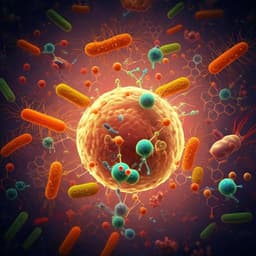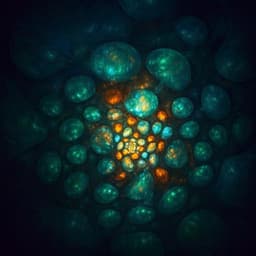
Medicine and Health
Comprehensive profiles and diagnostic value of menopausal-specific gut microbiota in premenopausal breast cancer
M. Hou, F. Ou-yang, et al.
This study by Ming-Feng Hou and colleagues uncovers intriguing differences in gut microbiota between premenopausal and postmenopausal breast cancer patients. Noteworthy microbial markers were identified, highlighting their potential as non-invasive indicators for breast cancer detection.
~3 min • Beginner • English
Introduction
Breast cancer is the most commonly diagnosed cancer worldwide and a leading cause of mortality in women. While incidence is lower in Asia than in Western countries, a higher proportion of Asian patients are diagnosed at a younger, premenopausal age; in Taiwan, over 30% are younger than 50 years. Known genetic contributors (e.g., BRCA1/2, TP53, RAD50) account for a minority of early-onset cases, suggesting roles for environmental, dietary, and reproductive factors. The gut microbiota has been implicated in cancer risk and progression, notably through estrogen metabolism (the estrobolome) and production of bioactive metabolites. Prior studies of gut microbiota in breast cancer have focused largely on postmenopausal disease, leaving a gap in understanding for premenopausal patients. This study aimed to comprehensively characterize gut microbial profiles in pre- versus postmenopausal breast cancer, identify menopausal-specific microbial markers, assess diagnostic value, and infer functional pathways, with the goal of enabling noninvasive detection and informing prevention strategies for premenopausal breast cancer.
Literature Review
The gut microbiota, comprising over 10^14 microorganisms, influences metabolic, protective, and structural functions and its dysbiosis associates with diseases such as colorectal cancer, metabolic syndrome, inflammatory bowel disease, and neurological conditions. In cancer (the oncobiome concept), microbes can act via metabolites, direct effects on genomic stability and signaling, and modulation of immunity. In breast cancer, the estrobolome—gut bacterial genes with β-glucuronidase activity that deconjugate estrogens—can increase circulating estrogens, particularly relevant postmenopause. Bacterial metabolites may also influence distant sites including the breast. Prior human microbiome studies have often stratified healthy controls by sex or menopausal status rather than patients, and few have assessed premenopausal cases. Some reports observed altered diversity and composition in postmenopausal breast cancer, but data are limited for premenopausal disease. This study addresses that gap by comparing premenopausal and postmenopausal patients and controls.
Methodology
Design and participants: From October 2018 to December 2020, 267 female subjects were recruited at the Division of Breast Oncology and Surgery, Kaohsiung Medical University Chung-Ho Memorial Hospital: age-matched controls (Pre-C=50; Post-C=17) and de novo stage I–II breast cancer patients (Pre-BC=100; Post-BC=100). Exclusions included other malignancies and steroid, antibiotic, or probiotic use within 4 weeks prior to screening. Fecal samples were collected before any therapy (chemo/hormone/targeted), radiation, or surgery. Clinical data recorded: age, BMI, grade, stage, tumor size, and receptor status (ER, PR, HER2, Ki67). IRB approvals KMUHIRB-G(II)-20180018 and KMUHIRB-E(I)-20200285; informed consent obtained.
Fecal DNA extraction and 16S rRNA sequencing: DNA was extracted (QIAamp Fast DNA Stool Mini Kit), quality-checked (NanoDrop OD 260/280 1.8–2.0). The V3–V4 regions were amplified with specified primers, purified (AMPure XP), indexed (Nextera XT), sized (Agilent 4200 TapeStation), and sequenced on Illumina MiSeq (2×300 bp, Reagent Kit v3 600-cycle).
Bioinformatics and taxonomic profiling: Paired reads were quality-trimmed, short reads and chimeras removed, and clustered to OTUs at ≥97% similarity against Greengenes 13.8. Reads were also classified using BaseSpace RDP classifier. Alpha diversity (Shannon entropy, Venn diagrams) and beta diversity (PCoA D_0.5 UniFrac; PERMANOVA) were computed using BaseSpace, CLC Genomics Workbench 21 with Microbial Genomics Module, and GraphPad Prism 8.
Differential abundance and marker discovery: LEfSe (Kruskal–Wallis and Wilcoxon; α=0.05; LDA threshold=2) identified discriminant taxa present in >50% of samples in at least one group with abundance difference >0.0001 between max and min group means. Venn diagrams (absolute fold change ≥5, p<0.05) and heatmaps (R pheatmap; genera average relative abundance >0.5%; species >0.05%; Euclidean distance, complete linkage; excluding uncultured/unidentified taxa) aided marker selection. Correlation matrices (Spearman, cutoff |r|≥0.2) among genera (>0.5% mean relative abundance; excluding uncultured/unidentified) were visualized with ggcorrplot.
Functional inference: PICRUSt2 predicted functional profiles (KEGG Orthology, MetaCyc pathways). KO pathway (KOPath) abundances were calculated as sums over involved KOs and normalized. Differential pathway enrichment was assessed via Kruskal–Wallis, visualized by volcano plots (FDR vs log2 fold change) and boxplots for pathways with >50% nonzero samples in at least one group.
Statistics: Group comparisons used two-tailed t-tests and one-way ANOVA; significance thresholds p<0.05, p<0.01, p<0.001. Diagnostic performance of microbial markers was evaluated with ROC curves and AUC. Correlations used Pearson for some analyses (as specified) and Spearman for correlation matrices. Analyses conducted in GraphPad Prism 8.
Key Findings
- Cohort: 267 participants across four groups: Pre-C (N=50), Pre-BC (N=100), Post-C (N=17), Post-BC (N=100). Pre-BC and Post-BC had similar BMI and grade; tumor size and PR status differed.
- Diversity: Alpha diversity (Shannon) was significantly reduced in Pre-BC versus Pre-C; no significant alpha diversity difference between Post-C and Post-BC, nor between Pre-BC and Post-BC. Beta diversity (PCoA D_0.5 UniFrac; PERMANOVA) showed significant overall microbial composition differences among groups (p<0.001).
- Taxonomic shifts: At higher levels, Actinobacteria enriched in Pre-C; Verrucomicrobia in Post-C; Proteobacteria in Post-BC.
- Fourteen taxa identified as markers, grouped by menopausal status:
• Premenopausal-specific (with/without age effects): Decreased Bifidobacterium longum, B. bifidum, B. adolescentis (fluctuate with age; specifically reduced in Pre-BC); Increased Anaerostipes and Bacteroides fragilis (age-independent; higher in Pre-BC than Post-BC).
• Postmenopausal-specific: Decreased Akkermansia muciniphila and Phascolarctobacterium (fluctuate with age; specifically reduced in Post-BC); Increased Proteobacteria and Klebsiella pneumoniae (age-independent; higher in Post-BC than Pre-BC).
• Universal (both pre- and postmenopausal BC): Decreased Faecalibacterium prausnitzii, Ruminococcus gnavus, Rothia mucilaginosa; Increased Sutterella and Haemophilus parainfluenzae.
- Age correlations:
• Controls: Bifidobacterium longum negatively correlated with age (r=-0.21, p=0.08); Akkermansia muciniphila positively correlated (r=0.28, p=0.02).
• Breast cancer: Anaerostipes (r=-0.13, p=0.06) and Bacteroides fragilis (r=-0.17, p=0.01) negatively correlated with age; Klebsiella pneumoniae positively correlated (r=0.16, p=0.02).
• Correlation matrices suggested protective associations of Bifidobacterium in Pre-C (negative correlations with Sutterella and Anaerostipes) and of Akkermansia/Phascolarctobacterium in Post-C (negative correlations with Haemophilus and Klebsiella).
- Diagnostic performance using composite ratios of increasing/decreasing taxa:
• Premenopausal (Pre-BC vs Pre-C): Ratio mean 3.06 vs 0.33; AUC=0.826, p<0.001 (excellent discrimination).
• Postmenopausal (Post-BC vs Post-C): Ratio mean 4.03 vs 0.27; AUC=0.887, p<0.001 (excellent discrimination).
• All breast cancer vs controls: Ratio mean 1.18 vs 0.29; AUC=0.791, p<0.001 (acceptable discrimination).
- Functional inference:
• Pre-BC vs Pre-C: Enrichment of steroid-related MetaCyc pathways (meta-cleavage of aromatic compounds; aromatic biogenic amine degradation; androstenedione degradation) and oncogenic KEGG pathways (Cell cycle; Tight junction; Notch/Wnt signaling).
• Post-BC vs Pre-BC: Greater enrichment of KEGG steroid-related pathways (aldosterone synthesis and secretion; aldosterone-regulated sodium reabsorption) and chemical carcinogenesis.
Discussion
The study demonstrates menopausal-status-specific alterations in the gut microbiota of breast cancer patients. Premenopausal breast cancer is characterized by loss of alpha diversity (dysbiosis) and reductions in probiotic/tumor-suppressive taxa (e.g., Bifidobacterium spp., Faecalibacterium prausnitzii) with concurrent increases in potential oncobiome taxa (e.g., Bacteroides fragilis), aligning with mechanisms involving microbial metabolites, genomic instability, and immune modulation. Postmenopausal breast cancer shows enrichment of Proteobacteria and Klebsiella pneumoniae and reductions in Akkermansia muciniphila and Phascolarctobacterium, consistent with dysbiosis and loss of beneficial SCFA producers. Age-related patterns differ between controls and patients, suggesting disease-specific shifts overriding normal aging trends. The composite microbial ratios provided strong discriminatory power by menopausal status, highlighting potential for noninvasive microbiome-based diagnostics. Functional predictions suggest steroid metabolism and oncogenic signaling involvement in premenopausal disease (including pathways potentially activated by B. fragilis such as Notch/β-catenin), and aldosterone/chemical carcinogenesis pathways in postmenopausal disease. These findings address a gap in prior research focused mainly on postmenopausal patients and support the concept of menopausal-specific microbiome signatures in breast cancer.
Conclusion
This study provides the first comprehensive evidence that gut microbiota profiles in premenopausal breast cancer differ from those in postmenopausal breast cancer. Fourteen menopausal-specific and universal microbial markers were identified, and composite ratios of these taxa showed excellent or acceptable diagnostic performance for distinguishing patients from controls by menopausal status. Premenopausal breast cancer is marked by decreased diversity and loss of probiotic/SCFA-producing taxa, while postmenopausal disease shows increased pathogenic taxa. Functional pathway predictions implicate steroid metabolism and oncogenic signaling in premenopausal patients and aldosterone/chemical carcinogenesis pathways in postmenopausal patients. These menopausal-specific microbial markers may enable noninvasive detection and inform prevention strategies for premenopausal breast cancer. Future research should validate these markers in larger, independent cohorts, integrate metagenomic/metabolomic profiling to refine functional insights, and assess causality and intervention potential (e.g., diet, probiotics, prebiotics).
Limitations
- Study design was observational and cross-sectional, limiting causal inference.
- 16S rRNA sequencing with PICRUSt2 provided predictive (not direct) functional inference; shotgun metagenomics/metabolomics were not performed.
- Single-center cohort from Taiwan may limit generalizability to other populations.
- Group sizes were imbalanced, particularly a small postmenopausal control group (Post-C N=17), which may affect statistical power.
- Only de novo stage I–II patients were included; findings may not extend to advanced disease or patients post-therapy.
Related Publications
Explore these studies to deepen your understanding of the subject.







